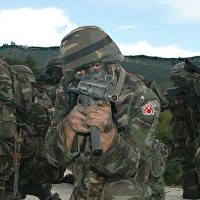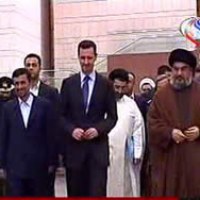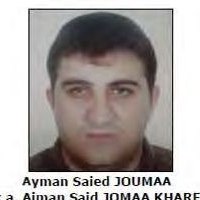![]()
Sun, June 12, 2011 | Debka.com

Syrian troops arrive in the flashpoint town of Jisr al-Shughur on June 11. Syrian troops fought violent battles with "armed gangs" in flashpoint Jisr al-Shughur town, state television said, as international outrage mounted at the regime's harsh crackdown on protesters. (AFP)
Is the Battle of Jisr a-Shughour the tipping-point of the uprising against Bashar Assad?
A DebkaFile report:
It took Syrian president six days to send troops and tanks to punish the small northern town of Jisr a-Shughour near the Turkish border for attacking and killing 120 Syrian security personnel last Monday. Although thousands of residents fled, the operation which began Friday June 10 ran into stiff resistance. Syrian TV later reported that security forces had arrested a large number of “armed group” leaders responsible for “violent acts” and wounded and killed many more — “despite the numerous ambushes set up against the army units.” Refugees report a major purge is taking place in the defiant town and its buildings leveled. According to some reports, the soldiers are shooting defectors.
Saturday night, June 11, the US accused Syria, of creating a humanitarian crisis and urged it to stop offensive — still avoiding any reference to President Bashar Assad by name as the party responsible for the crisis.
It took Assad several days to attack Jisr a-Shughour because he couldn’t decide which unit to send to the rebellious town. He first sent the 85th Armored Brigade on this mission and then replaced it with the 47th Armored Brigade under the command of his brother Gen. Maher Assad, together with the expanded 555th commando battalion. As the Syrian army’s top-notch unit, the 47th Brigade had been held in reserve in Damascus for defending the regime in a last resort. The opposition took advantage of its absence from the capital for an attempt to raise a protest rally which was broken up before it drew substantial numbers.
The small border town has acquired strategic importance way beyond its size and location — and not only as a potential tipping point for the uprising against the Assad regime.
The battles there will impinge on how the Turkish Prime Minister Tayyip Erdogan fares in the general election Sunday, June 12 and the Muslim Brotherhood’s position in the Arab Revolt (Jisr a-Shughour is one of its bastions). Iran, as President Assad’s foremost ally, has a stake there, especially after Saudi military intervention stalled its push into the Gulf Emirates on the backs of Shiite protesters.
Erdogan is generally expected to achieve a major election victory in his run for a third term in office after 10 years — and even possibly a majority in parliament for reforming the constitution to unite the posts of prime minister and president.
He can boast of important achievements in his 10 years in office, but is after the major triumph of acknowledgement as head of the paramount Muslim power. A Sunni Muslim rebel win against Assad’s Iran- and Hizballah-backed forces in the Battle of Jisr a-Shughour would show that Erdogan played the right horse after failing to ride the wind of protest in the Arab world.
Its eruption threw the bloc formed by Turkey, with Iran, Syria and Hizballah onto the wrong side of the Arab revolt. The Turkish prime minister played no role in the Egyptian uprising and, in Libya, both Muammar Qaddafi and the Benghazi rebel government scorned his feelers for influence when they saw him gyrating between going with NATO of which Turkey is a member, siding with Qaddafi and aiding the rebels.
The Turkish prime minister’s decision to send troops into to Syria and establish a buffer zone on the Syrian side of the border (as DEBKfile first reported Friday, June 10) is a gamble which places him in opposition to Tehran, spells finis to the Turkish-Iranian pact and ends his hopes of acting as a bridge between Sunnis and Shiites.
Sunni Muslims across the Middle East are watching the battle of Jisr a-Shughour and assessing the numbers of Sunni defections from the Syrian army fighting their coreligionists there. If they are substantial and spill over into military units in other parts of Syria, this battle could become the tipping-point of the uprising against Bashar Assad. It would also be the Muslim Brotherhood’s first military achievement since the Arab Revolt began, after holding themselves aloof from the uprisings in Tunisia, Egypt, Yemen and Libya.



 RSS
RSS










Latest Comments
Hello Mike, Thank you for your positive feedback to the article. I felt there wasn’t too much critical analysis of ...
Thanks for this considered and well constructed article. A follow up article on the manner in which the editorial contro...
THE CLUELESSNESS OF CLAIMING THAT OBAMA'S MIDDLE EAST POLICIES WERE A FAILURE CANNOT BE FURTHER FROM THE TRUTH, WHAT THE...
As long as Obama is the president of the usa do not trust the us government......
Thank you for an good read....